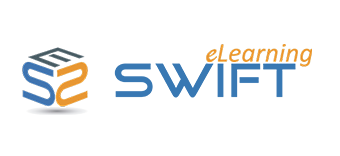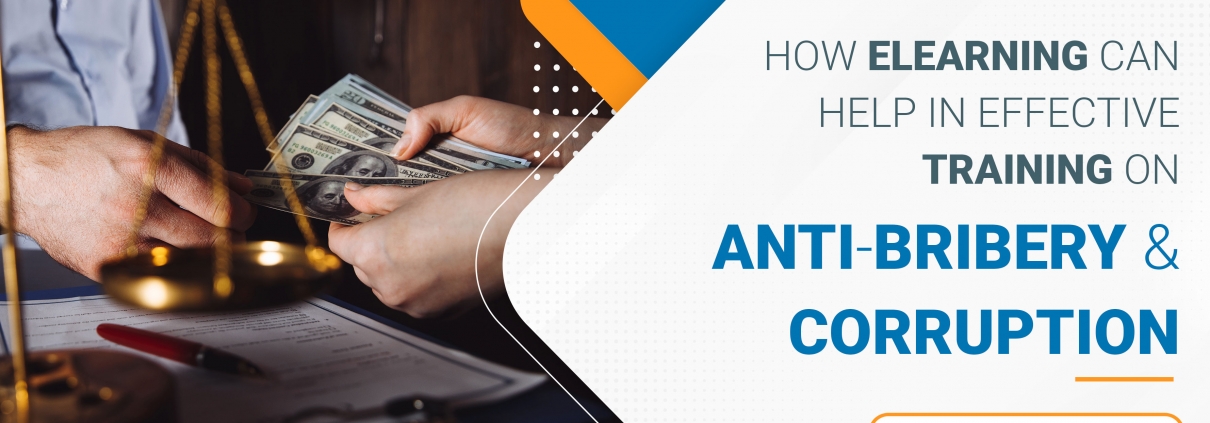How eLearning can help in effective training on anti-bribery and corruption
Companies these days have a zero-tolerance policy for bribery and corruption and are committed to acting professionally and fairly in all business dealings and relationships, as well as creating and executing an effective system to prevent bribery and corruption in any form. Hence a training on anti-bribery and corruption is very important in these companies.
In this blog, we will look at what bribery and corruption mean and the forms of bribery existing in the system and how eLearning can help in the effective training of employees regarding anti-bribery and corruption.
What is meant by Bribery?
Bribery is the offering of something of value that is intended to influence the actions of others, generally the private and government official who holds some form of legal duty related to the actions you are attempting to effect. It is an encouragement to do something dishonest, illegal, or a breach of trust.
There are always two sides to bribery
- Bribe giver: When a person gives, promises, or offers a bribe.
- Bribe taker: When a person, receives, accepts, or requests a bribe.
According to the law, the giver and taker of bribes are equally responsible for corruption and bribery and they both are punishable. Not all forms of corruption are bribed, but bribery will always be corruption.
What is meant by Corruption?
Corruption is dishonest or fraudulent behavior by those in a position of power, such as managers or government officials involving bribery and corruption.
Corruption can include:
- Accepting and giving bribes
- Diverting Funds
- Providing Inappropriate gifts
- Wrong transactions
- Money Laundering
- Securities fraud
Forms of bribery that pose the greatest risk
There can be numerous forms of bribery and corruptions, but the following areas pose the greatest risk:
✓ Gifts and Hospitality
A bribery can be anything that:
- Is not given in the name of the company, but in the name of the employee
- Includes cash or a cash equivalent (such as gift certificates or vouchers)
- Is not given openly, but secretly
- Is not appropriate in the given circumstances and is not reasonable and justifiable
✓ Charitable contributions and sponsorships
✓ Facilitation payment and kickbacks
Facilitation payment, small expenditures, or grease payments are made to government officials to facilitate or expiate the performance of a routine, non-discretionary governmental action that the official is already obligated to perform, such as the issuing of certain permits, licenses, visas, and mail. Any decision by a government official to award new business or to continue doing business with a company is not included in the facilitation payment.
✓ A kickback is a type of negotiated bribe in which the bribe taker is paid a commission to service. Kickback is different from other types of bribery that it involves collusion between agents of both parties, rather than one party taking a bribe from the other. The purpose of kickbacks is usually to encourage the other party to corporate in the illegal scheme.
The company facilitation payment or grease payment or kickbacks of any kind, regardless of whether such payments are permitted under applicable law.
What is the purpose of providing training on anti-bribery and corruption?
Training on anti-bribery and corruption helps to set out our responsibilities, and those of anyone working for and on our behalf, in observing and upholding our position on bribery and corruption in government and non-government (private commercial) dealing.
It also provides information and guidance on how to recognize and deal with bribery and corruption issues to those working for us, including but not limited to the entire supply chain and any third party (or their associated enterprises conducting business with the company).
Scope of the training on anti-bribery and corruption:
The training applies to company employees and third parties of any type. Employees include all directors, officers, employees directly or indirectly involved, regardless of grade and position, in all countries where the company operates, in terms of all matters and transactions.
Who is included in Third-party?
This means that any individual or organization that has business with the company, including the actual or potential business associate, customer, contractor, subcontractor, business partner, supplier distributor, business contracts, technical agent and other advisors and government agencies and officials or any other person related with or acting on behalf of the company.
Here are 3 ways how E-learning helps effective training in bribery and corruption
Companies are looking for ways to reach consumers around the world. ELearning can provide the best platform to train employees on bribery and corruption and hence fulfil their objective of a corruption-free workforce.
Given are few ways eLearning helps in designing effective anti-bribery and corruption training.
1) Ease of training for the Employee:
Global Anti-Bribery and Corruption (Basic) delivers important information to employees who need a foundational understanding of when gifts, entertainment, or hospitality are considered a business expense – and when they are a bribe. Employees will be trained on appropriate and inappropriate gifts and entertainment, and global rules and regulations, foreign officials, and third parties.
With eLearning, you can access the training anytime, anywhere without bounding to any particular place or device.
2) Scenario based Training:
By using strategies like scenario based training approach, we can create scenarios where the learners can be put into situations where they can decide what is right or wrong and provide feedback to their responses. This helps them to realize the consequences of their decision and hence help in greater knowledge retention.
3) Training with gamification:
With gamification approach, you can create immersive learning experiences for the learners. Because of using provocative game elements for every decision, you can change the behavior of the learner about the good and bad aspects of bribery and corruption.
Click on the image below to access our free Anti-Bribery and Corruption course.
Conclusion:
The bribery and corruption training teaches employees about bribery and corruption, its various forms, signs, and ways to prevent it, and eLearning provides the best technology to make them efficient.
Our services: Convert PowerPoint to eLearning, Rapid eLearning Development, Custom eLearning Development, Translation and Localization, Flash to HTML5 Conversion Services






Leave a Reply
Want to join the discussion?Feel free to contribute!